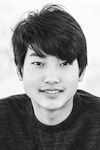
Noah Kurima
“What are you?” It is such a straightforward question. But for many Japanese Americans in my generation, the answer is not simple. After 16 years in this world, an online course has opened my eyes to the history of my family and helped me finally understand the answer to this question.
Plans for my junior year of high school went off the rails as the pandemic continued. With school activities suspended and stuck at home with my baby sister, I found and applied to a class I could attend from my bedroom. Miraculously, I was accepted into the Reischauer Scholars Program, sponsored by the Stanford Program on International and Cross-Cultural Education.
During RSP, we learned about Japanese history and culture, as well as the past and the current U.S.-Japan relationship. Weekly Zoom calls began in February, and we are currently polishing up our final argumentative essay.
As a college-level course, I spend five to eight hours a week (sometimes more!) to absorb the material, complete assignments and contribute to ongoing online discussions.
Although a lot of hours on top of regular schoolwork, I highly recommend RSP, even after the pandemic is over! I have been able to meet and become friends with 28 brilliant classmates from across the U.S. and across demographics.
I imagine I will keep in touch with them over the following decades as our lives and careers intertwine.
We have learned from some of Stanford’s and the nation’s most prestigious scholars. Our own professor, Naomi Funahashi, brings passion to each class — and patience when our classmate, Ben, only wants to talk about boba!
Under her leadership, we have developed a close-knit and fun community.
Our lessons on Japan began with the sun goddess Amaterasu emerging from her cave and wrapped up with a unit on the triple disasters of 2011 and the future of Japan. In between, we heard stories from an actual Buddhist monk, dissected a 1932 Yasujiro Ozu silent film and heard from George Takei on his family’s experiences during World War II. He was gracious enough to send signed copies of his new book to each member of the class!
One unexpected outcome from the course was increased dialogue with my parents over dinner about our family history. Sometimes, we enlisted the help of my grandparents and other relatives to fill in blind spots. A few of the stories absolutely blew my mind.
My maternal great-grandparents immigrated from Korea to Japan in the 1930s. After WWII, the former Japanese colony was divided. The North had charismatic leaders and effective propaganda in Japan, and my great-grandparents affiliated themselves with North Korea — as most zainichi (Koreans in Japan) did at the time. However, those returning to North Korea were never heard from again, and the zainichi began to realize they were being deceived.
In the 1960s, my great-grandfather was visiting relatives in South Korea when he was kidnapped by the Korean CIA. He was not heard from for three days. He was released and returned to Japan but never stepped foot on Korean soil again. He never spoke about those 72 hours to anyone, and nobody knows what he endured.
Like most of you, I am connected to WWII incarceration — my grandparents were both taken to Jerome, Ark. My great-uncle, Herb Kurima, was a well-known pitcher in Nikkei baseball and had a physically and mentally disabled brother.
Toyoki ate only Japanese food, spoke only Japanese and needed constant attention from their mother. The U.S. government would not allow Toyoki to accompany the family and denied requests from his brother to take him inland. Toyoki was institutionalized while my family was sent to Fresno. Toyoki passed away within weeks.
I now understand so much more about Japanese society and its issues. But I am most thankful to the RSP for triggering those evening talks with my parents.
I not only learned about the unimaginable adversities my great-grandparents had to face on both sides of the world — but also their resilience. I now have faith I possess the fortitude to persevere and overcome the challenges in my own life.
It’s in my blood!
And now I know what I am. I am Japanese American, fourth generation through my grandmother, fifth through my grandfather, second through my mom (a weighted average of 3.25!). And though she was born and raised in Japan, I am also Korean — a proud zainichi from both the South and the North.
Programs such as RSP can inspire a more comprehensive understanding of one’s unique identity. Whether enrolling in this type of program or not, I encourage young people, especially JAs, to sit down with parents, grandparents and other relatives.
Pepper them with questions and fill in your blind spots so that you can confidently and accurately answer that seemingly simple question, “What are you?”
Noah Kurima is currently a junior at Sage Creek High School in Carlsbad, Calif. He is a founding member of the Junior Board of the JACL San Diego chapter. He hopes to study international relations and international policy in college.



